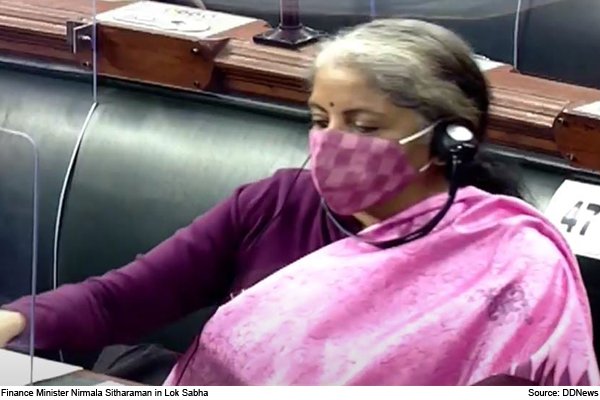New Delhi: Union Finance and Corporate Affairs Minister Nirmala Sitharaman presented the Economic Review 2020-21 in Parliament on 29 January 2021, saying that Service Purchasing Manager Index, air passenger traffic, rail traffic, port traffic, foreign passenger arrivals, and foreign Key indicators such as exchange have reached their lows and are showing a V-shaped improvement.

According to the review, India’s service sector was reported to have fallen drastically due to the lockdown imposed due to the nature of rapid spread from exposure to the Covid-19 epidemic. During the first half of FY 2020-21, the sector recorded a decline of around 16 percent. Domestic passenger traffic is also slowly improving on a monthly basis, although overall demand remains sluggish compared to the previous year. The review predicts a resurgence of service areas with broad connectivity due to the currently ongoing vaccination campaign.
FDI flow in India
According to the review, despite the global upheaval, FDI inflows to India’s services sector have increased significantly by 34 percent to $ 23.6 billion during April-September 2020 on an annual basis. This increase was well supported by the computer and hardware sub-sector, with a growth of 336 percent in FDI inflows during the same period. According to the review, FDI inflows in sub-sectors like retail trade, agricultural services, and education have also shown good growth. According to the World Investment Report 2020, India improved from 12th position in 2018 to 9th position in 2019 in the list of countries with the highest FDI.
Gross Value Added (GVA)
According to the review, 54 percent contribution to India’s GVA and 80 percent contribution to FDI inflows shows the importance of the services sector at present. Of the 33 states and union territories, the contribution of the sector in gross state value addition of 15 is more than 50 percent, while in Delhi and Chandigarh this figure is even more. Accordingly, states with a relatively low share of the service sector in GSVA have recorded strong growth in service sectors in recent years. The services sector accounts for 48 percent of the total exports and has outpaced the export of goods in recent years.
Tourist area
According to the review, the prevention of Covid-19 has had a significant negative impact on global travel and tourism, with travel restrictions, consumer self-confidence, and global conflict, and its resurgence is anticipated due to the currently ongoing vaccination campaign. The number of foreign tourists visiting India on e-visas has increased from 4.45 lakhs in 2015 to 29.28 lakhs in 2019, as the e-tourism visa system has increased from 46 countries in 2014 to 169 countries.
IT-BPM Services
According to the review, several major structural reforms have taken place in the year 2020-21. The rules related to telecom were separated from IT-BPM and consumer safety regulations were introduced for e-commerce. The IT-BPM industry has also welcomed policy reforms such as the OSP Guidelines and the New Umbrella Entity Flexibility to promote innovation and efficiency.
Start-up ecosystem
According to the review, despite the Covid-19 epidemic, India’s start-up ecosystem continues to grow. The ecosystem has grown rapidly under difficult circumstances and a record 12 start-ups have made it to the list of unicorns last year, raising their total number to 38.
Shipping
The review noted a reduction in the time taken for ships to and from ports to ports, which has been halved from 4.67 days in 2010-11 to 2.62 days in 2019-20. According to the latest data from UNCTAD, the 0.97 days it takes for a global intermediate ship to return shows that there is still considerable room for improvement in the efficiency of ports in India.
Space field
According to the review, India’s space sector has recorded good growth in the last six decades. India has spent about $ 1.8 billion on space programs in 2019-20. However, the country still lags far behind countries like the US, China, and Russia, which spend nearly six times more in this region. India’s space sector is undergoing several policy reforms such as connecting private companies and attracting innovation and investment.
